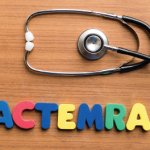
ajt/shutterstock.com
New RA Antibody Treatment
SAN DIEGO—A recent study examined the pharmacokinetics, safety and efficacy of E6011, an anti-fractalkine monoclonal antibody designed to treat rheumatoid arthritis (RA).1 Researchers presented the results of this first 52-week trial of E6011 at the 2017 ACR/ARHP Annual Meeting in November. Fractalkine (CX3CL1/FKN) is a chemokine that regulates chemotaxis and adhesion of CX3C chemokine receptor 1 (CXCR1)-expressing inflammatory cells.
During the study’s treatment phase, Japanese patients with active RA who had an inadequate response or intolerance to methotrexate or tumor necrosis factor-alpha inhibitors received E6011 at Weeks 0, 1 and 2, and every two weeks thereafter for up to 10 weeks. Patients received 100 mg (n=12), 200 mg (n=15) or 400 mg (n=10) doses.
If the agent showed no safety concerns, patients who had a greater than 20% improvement in both tender and swollen joint counts were given the option to receive an additional 20 biweekly treatments at the same dose in an extension phase. Of these 37 patients, 11 patients treated with 100 mg, 11 patients treated with 200 mg and 6 patients treated with 400 mg entered the extension phase, which lasted 52 weeks.
Repeated doses of E6011 were safe and well tolerated during the extension phase. The steady-state drug dosing for E6011 was attained at Week 2 and maintained through Week 52. At Week 12, ACR20 responses were achieved by 75% of 100 mg-treated patients, 80% of 200 mg-treated patients and 70% of 400 mg-treated patients. At Week 52, which was the last observation carried forward, the ACR20 responses included 58% of 100 mg-treated patients, 73% of 200 mg-treated patients and 60% of 400 mg-treated patients.
The incidence of adverse events was 84%, the incidence of treatment-related adverse events was 49%, and the incidence of serious adverse events was 14%. No deaths were reported during the study, and no differences between the groups were observed in the incidence or severity of adverse events.
Due to the positive results of this trial, E6011 will be studied in a Phase 2 trial designed to determine its optimal clinical dosing, as well as to further characterize its safety and efficacy in a placebo-controlled, double-blinded setting.
E6011 will be studied in a Phase 2 trial designed to determine its optimal clinical dosing, as well as to further characterize its safety & efficacy in a placebo-controlled, double-blinded setting.
Tocilizumab Monotherapy
SAN DIEGO—A recent study presented at the 2017 ACR/ARHP Annual Meeting in November evaluated the sustained response of RA patients treated with subcutaneous tocilizumab following the discontinuation of methotrexate. This randomized, controlled trial examined whether tocilizumab monotherapy was non-inferior to tocilizumab plus methotrexate in maintaining a clinical response in RA patients who had achieved low disease activity while taking tocilizumab plus methotrexate during a prior trial known as COMP-ACT.2
During the study, patients who initially had an inadequate response to methotrexate received ≥15 mg oral methotrexate weekly plus 162 mg subcutaneous tocilizumab weekly, or 162 mg subcutaneous tocilizumab every two weeks. At Week 12 if patients had not achieved low disease activity (DAS28 ≤3.2), they could increase their dosing frequency from every two weeks to weekly. Patients who achieved DAS28-ESR ≤3.2 at Week 24 were randomized in a double-blind manner to receive either tocilizumab monotherapy or tocilizumab plus methotrexate through Week 52.
The primary outcome was the comparison of mean change in DAS28-ESR score from Weeks 24 to 40 between the tocilizumab monotherapy and tocilizumab plus methotrexate arms. The trial’s secondary outcomes included the proportion of patients who achieved DAS28 <2.6, DAS28 ≤3.2 and ACR20/50/70 responses at Weeks 40 and 52. Safety was also assessed, and 718 patients were enrolled.
At Week 24, 296 patients who had achieved DAS28-ESR ≤3.2 were randomized, with 148 receiving tocilizumab plus methotrexate and 148 receiving tocilizumab monotherapy. Early discontinuation in randomized patients was similar in both treatment groups. The mean patient age was 56 years, 75% of patients were women and the mean duration of RA of was 6.8 years. The mean DAS28-ESR was 6.3, and baseline characteristics were similar between the two groups.
DAS28 scores at Week 24 were similar in both treatment groups, but ACR responses were approximately 10% lower in the tocilizumab monotherapy group prior to methotrexate withdrawal (randomization). This study met its primary endpoint, demonstrating that discontinuing methotrexate in tocilizumab responders was non-inferior to continuing methotrexate.
In this study, the safety profile of subcutaneous tocilizumab was consistent with its known safety profile. No new safety signals were observed. Infection was the most common serious adverse event, occurring in 4.1% of patients.
Patients receiving combination therapy had a greater frequency of adverse events, serious adverse events and serious infections than those receiving tocilizumab monotherapy.
The results of this study show that patients receiving both tocilizumab plus methotrexate with low disease activity can discontinue methotrexate and preserve disease control.
Michele B. Kaufman, PharmD, BCGP, is a freelance medical writer based in New York City and a pharmacist at New York Presbyterian Lower Manhattan Hospital.
References
- Tanaka Y, Takeuchi T, Umehara H, et al. Safety, pharmacokinetics and efficacy of E6011, an anti-Fractalkine monoclonal antibody, in a first-in-patient Phase 1/2 study on rheumatoid arthritis: 52-week results [abstract 1907]. Arthritis Rheumatol. 2017;69(suppl 10).
- Kremer J, Rigby WFC, Singer N, et al. Sustained response following discontinuation of methotrexate in patients with rheumatoid arthritis treated with subcutaneous tocilizumab: Results from a randomized controlled trial [abstract]. Arthritis Rheumatol. 2017;69(suppl 10).



